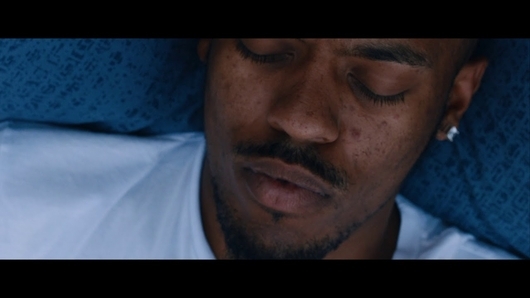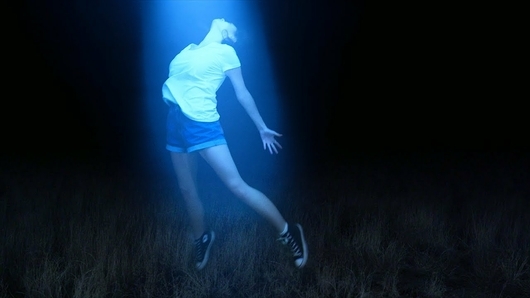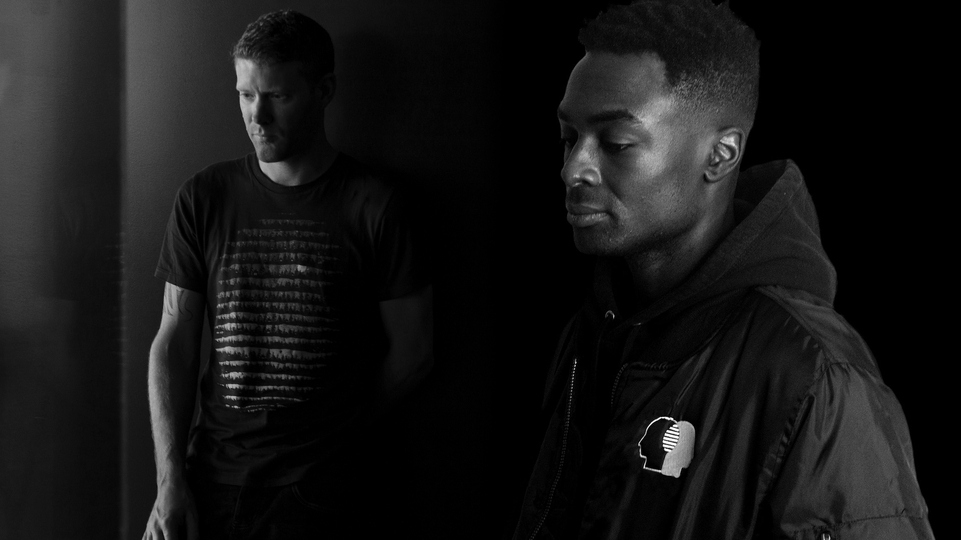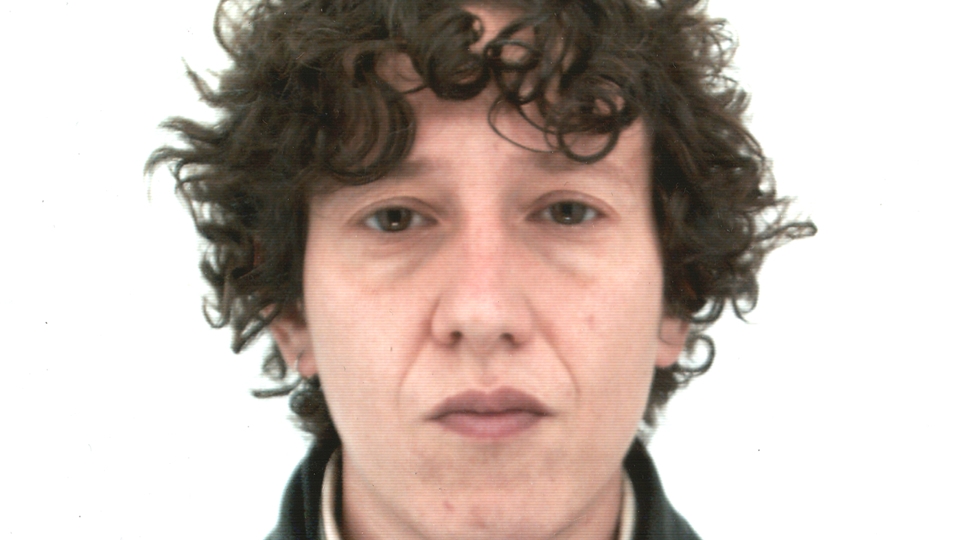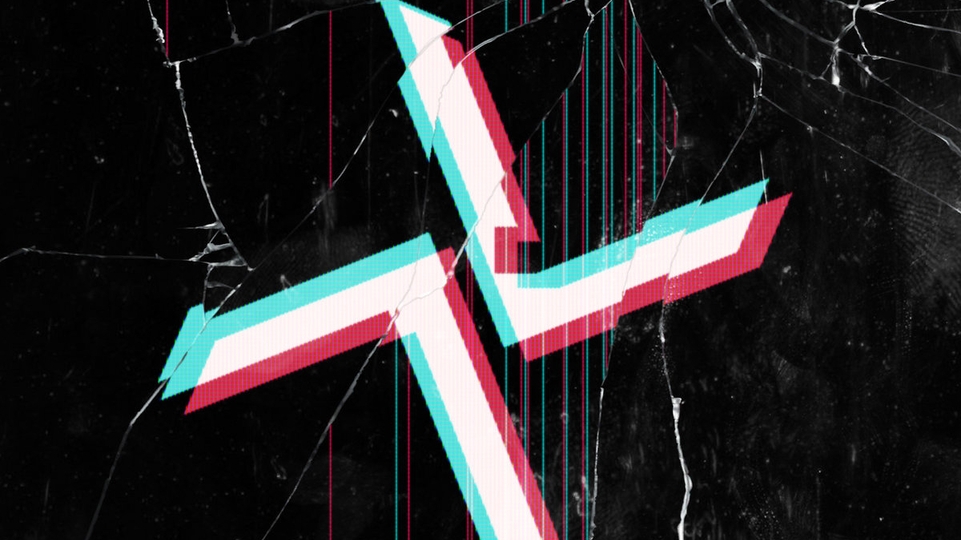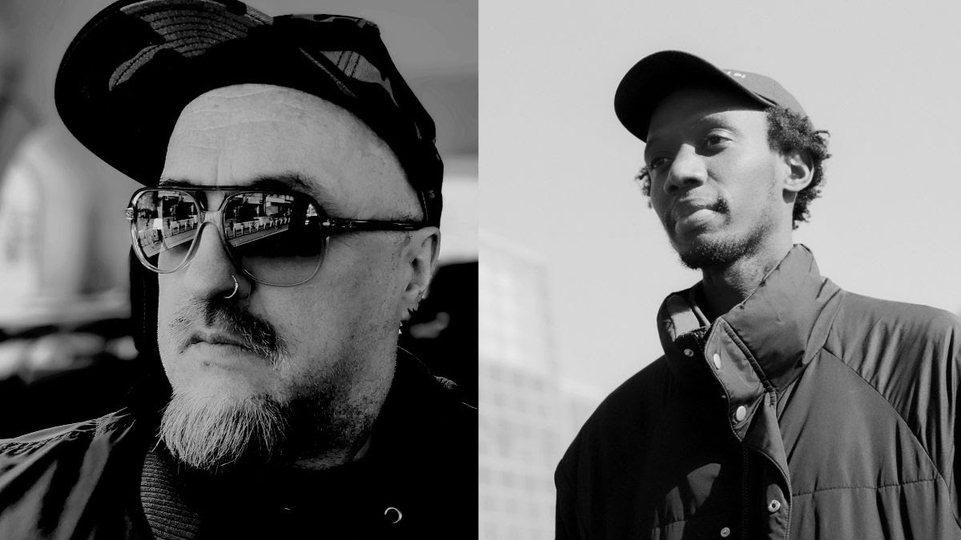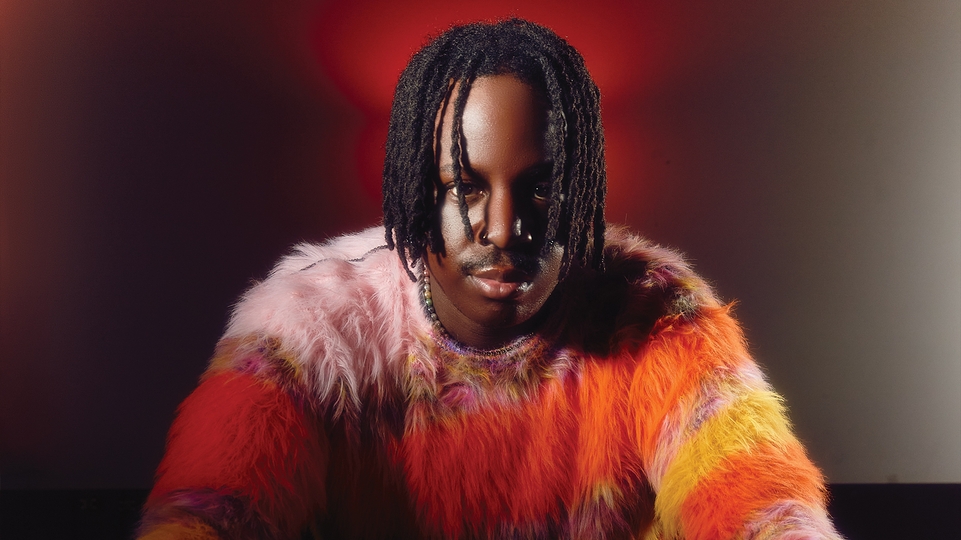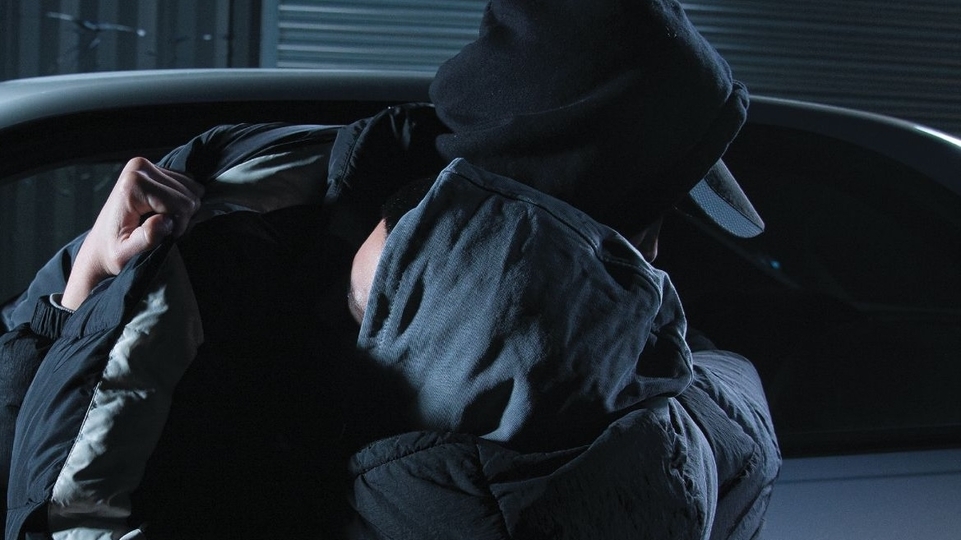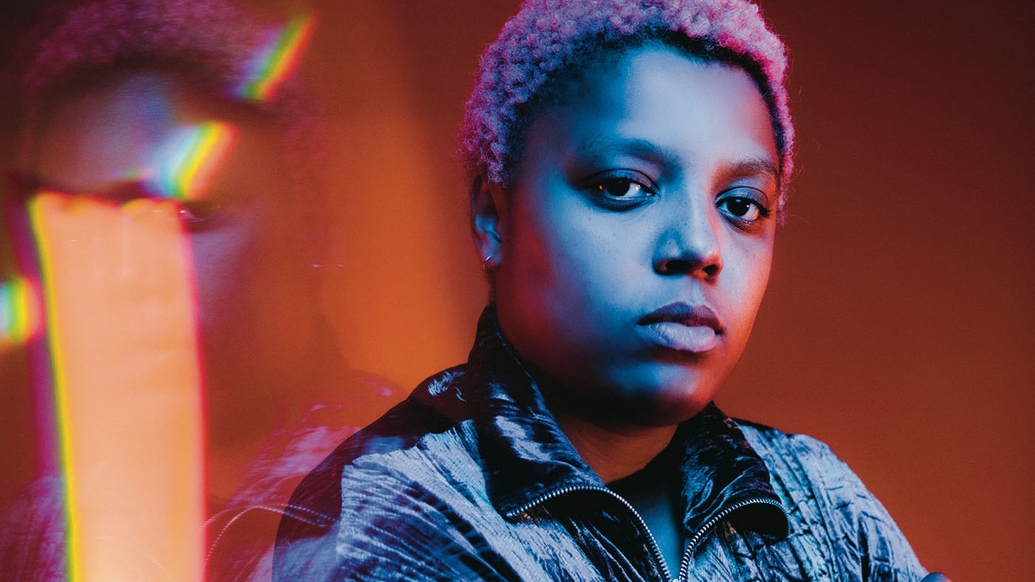
Loraine James: the art of instinct
Innovative London producer, live act and Hyperdub affiliate Loraine James has forged her own path with a personal sound that blends IDM, glitch and ambient with math rock, R&B and more. After releasing two albums in 2022 — for Ghostly International and Phantom Limb — and playing the Southbank Centre with the London Contemporary Orchestra, she meets Eoin Murray to discuss reimagining the works of American avant-garde composer Julius Eastman, expressing emotion through music, and staying true to her instincts
If you’d have told Loraine James a year ago that on a Sunday night in October 2022 she’d be performing at London’s Southbank Centre alongside a 15-piece orchestra, she probably would have laughed. After all, it’s not just any artist whose music can be configured for a contemporary classical setting as comfortably as it can for a dark and sweaty club. But the 26-year-old, Enfield-born electronic music producer and live act is not just any artist.
James has spent the best part of a decade developing a personal sound that is brilliantly tough to categorise. Her catalogue comprises five albums to date, peppered with additional EPs and self-released material on Bandcamp. Across these, rhythmic shards of IDM, drill (‘n’ bass) and glitch spark off melodies that are as indebted to the Midwest emo and math rock genres as they are to ambient music and R&B. James’ vocals, and those of her collaborators, confront themes of self-confidence, anxiety, the creative process, and the realities of being a young, queer, Black person in the UK with varying degrees of candour and subtlety. Her two albums for Hyperdub — 2019’s ‘For You & I’ and 2021’s ‘Reflection’ — were critically lauded for their razor-sharp yet vulnerable take on the craft: something she describes now as a combination of “the softness and the madness”.
2022 has seen James release two full-length albums, collaborate with her friend TSVI on an EP for the AD 93 label, host a monthly show on NTS Radio, rework some of her favourite tracks from previous projects for an Apple Music spatial audio mix, and even appear on the streaming giant’s front page as the face of its electronic music category. She’s also played landmark shows, including MUTEK Festival in Montréal, Sustain-Release in upstate New York, Dekmantel in Amsterdam and Unsound in Kraków. Basically, she’s been busy.
In conversation, James seems regularly surprised, puzzled even, by the journey her music has taken her on these past few years. Self-deprecating and prone to brushing off praise with a deflective chuckle or counterpoint, she’s not one to outwardly buy into her own hype. To legions of devoted listeners though, her upward trajectory has appeared as natural and deserved as they come. Guided by intuition and an uncompromising dedication to doing things her way, James has forged her own path, and she’s sticking to it.
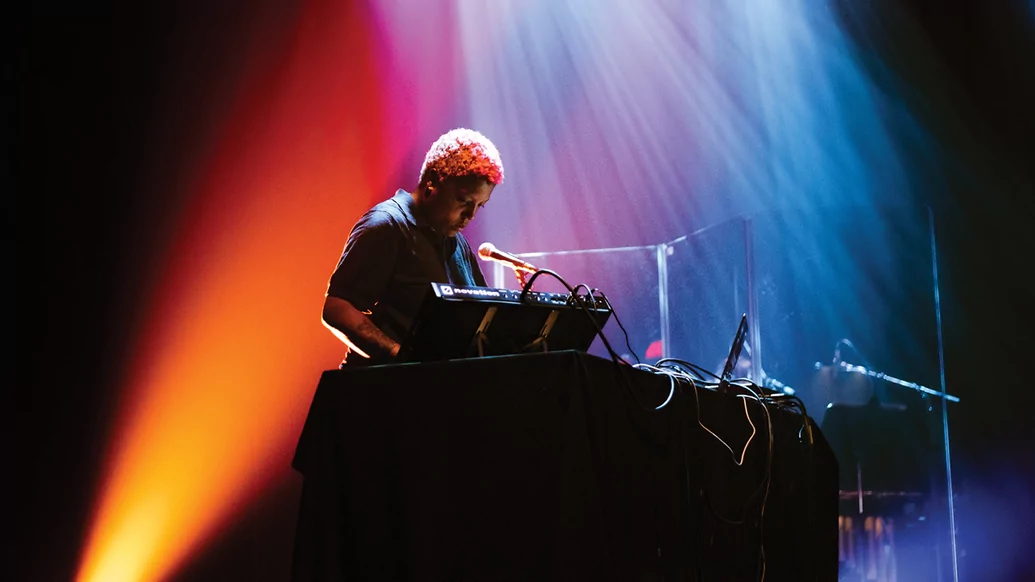
Standing stage right in the Southbank’s Queen Elizabeth Hall, James’ short pink hair is illuminated by an orange spotlight. Her setup of synths, pedals, pads and a sticker-strewn laptop appears modest next to the London Contemporary Orchestra (LCO) ensemble beside her; as her fingers take position on the keys, a supportive ‘YES LORAINE!’ echoes out from the crowd.
The opening notes of her new album for the Brighton-based Phantom Limb label, ‘Building Something Beautiful For Me’, ripple through the room: a melancholic melody that slowly unfurls with longing strings and vibraphone chimes.
A pattering beat crackles like a campfire’s embers as James’ pre-recorded voice sings the ruminative lyrics to ‘Maybe If I (Stay On It)’. The track, like most of the album, reimagines a composition by the late New York avant-garde composer Julius Eastman, whose 1973 work ‘Stay On It’ soars with ebullient instrumental motifs and syncopated rhythms. Its wonderfully aleatoric elements are regularly embellished by a repeated titular vocal refrain, a dogged ode to perseverance, hope and determination. James’ interpretation is decidedly more understated, but packs no less of a punch.
Over the course of an hour, James and the LCO run through the album’s eight tracks, from its elegant electronic soundscapes and celestial peaks into jolting orchestral passages and chaotic flurries of percussion. On stage, James appears calm and confident; the trademarks of her work — glitching arpeggios, stuttering drums, velvety synths, undecorated vocals — operate in alchemical harmony with the orchestra. But how did she feel standing up there?
“I was so nervous,” she tells us on a dreary afternoon two weeks later, sitting in a quiet pub near her home in East London, sporting a black hoodie and Discwoman cap. “But it was over so fast. I remember looking at the time and it was the last song already. I literally could have played for another hour... I want to do it again, for sure. It was probably the best thing I’ve ever done. The LCO are just amazing.”
Making use of equipment she’d never taken to a performance setting before — the Novation Peak polyphonic synth she played on the album, a Microcosm granular effects pedal, a Korg Kaoss Pad — the show saw James levelling-up her live technique from her usual MIDI acrobatics. “There was some stuff in there that I never thought I’d actually have to play [live],” she confesses.
“It’s surreal,” she continues. “When you make something on your laptop, you don’t expect it to be expanded into this big creation... It wasn’t on the list [of goals] that I had for this year; it wasn’t anywhere near, because I didn’t think it was even possible.”
Originally planned as a solo performance — which she insists would have sounded “pretty dead in comparison” — James’ work with the LCO began with her sending the album’s Ableton files to the orchestra’s Ben Corrigan and Sasha Scott, who transcribed the music. Before rehearsals began, Corrigan visited James at home and they discussed the process of turning her album into a proper show, putting her mind at ease after an initial bout of nerves. “The first rehearsal was with four players, and sounded very different,” she says. “But immediately after that I felt like, ‘Yeah, maybe I can actually do this’.”
After two complete rehearsal sessions, including one on the day of the show, James and the LCO took to the stage as a fully-fledged troupe. “It wasn’t me featuring the LCO,” she clarifies. “It was all of us performing together... [Having them with me] made me feel more grounded and comfortable and less afraid... It made me appreciate the album more when I played it with them.”
The show ended to rapturous applause and a standing ovation — not that James could see it. Despite initial plans to join the orchestra in a bow, in the heat of the moment her mind went blank and she left the stage with a wave and a handful of “thank you”s into her mic. “I needed a minute, so I just walked off,” she remembers now with a slightly embarrassed laugh. “A guy came up to me and asked if I was going to go back on, and I was like, ‘No’. I didn’t think about it, but I was like... ‘Why do I need to come back on? It’s done!’
“You can tell I don’t do this kind of thing,” she adds. “I could hear that people were clapping for ages... It felt really good. I feel like it couldn’t have gone any better, which is very rare for me to say. I just wish I had come back on! I forgot I wasn’t at a club.”
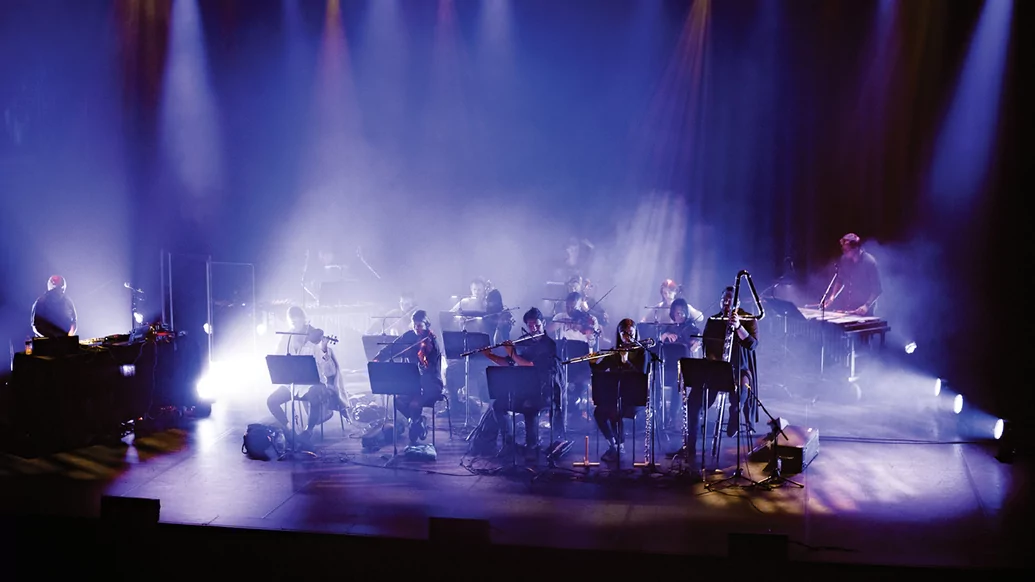
Writing ‘Building Something Beautiful For Me’ was unlike anything James had done before. When Phantom Limb got in touch with her in 2021 with the idea of creating something inspired by Julius Eastman’s music, she hadn’t even really heard of him. “But I’m always down for an album, innit,” she jokes.
Eastman, a prolific Black, gay composer, pianist and vocalist, worked restlessly through the ‘70s and ‘80s, producing works that brought a refreshing sense of groove, as well as elements of pop music and disco, to the world of American minimalism. His compositions and performances stirred controversy and confrontation; he famously infuriated John Cage with a provocative and overtly queer live take on one of his ‘Song Books’ in 1975. His identity was unapologetically integral to his creativity, and vice versa.
Despite his prominence, however, by the time of his death in 1990 at the age of 49, Eastman had been pushed out of the spotlight and into destitution. Alone, broke, homeless and reported to have been battling addiction and mental health issues, his genius became overshadowed by tragedy, with much of his music lost or forgotten.
In conversation with The Guardian newspaper recently, James spoke candidly about how, while studying music at university, she learned plenty about Eastman’s white peers such as Philip Glass and Steve Reich, but nothing about him. “For a long time I didn’t even know Black composers existed,” she said. “It’s not just an absence, it’s erasure — it feels as though there was effort made to leave him out.”
Considerable strides have been made in reinstating Eastman’s name in the canon of 20th-century music over the years. Composers Mary Jane Leach and Kyle Gann collected what scores and recordings there were to be found of his, and in 2015 the former co-edited a collection of essays on his life and music, Gay Guerilla, with Renée Levine Packer. In 2005, New World Records released ‘Unjust Malaise’, a three-CD collection compiling some of his most striking compositions.
On YouTube, ensembles from around the world now regularly present their takes on his music, from established orchestras to the group of frontline workers who performed ‘Stay On It’ virtually during the pandemic. Since last year, the California-based experimental classical collective, Wild Up, has been dedicated to producing a new seven-volume anthology of his work.
It was in this context that James sought to present her own interpretation. She was given a zip drive of Eastman recordings, courtesy of his brother Gerry, with whom Phantom Limb shared a connection, as well as a collection of transcribed MIDI stems. She then began the balancing act of producing a collection that paid tribute to the pioneering artist, but simultaneously sounded personal to her. “I just wanted it to be instinctive,” she says. “I wanted to go off how I felt listening to his work; feeling inspired and jumping off that. I was very nervous about it coming out because it is my album, but it’s also not my album, in a sense.
“When you look up his name, it’s a lot of other people just doing the exact thing that he did,” she continues. “I can’t do that... [This music] came out 30 years ago, I don’t want to replicate that. I didn’t see the point in being asked to do this if I’m just copying something that already exists.”
James entered into a sort of dialogue with Eastman’s catalogue, retooling sounds and ideas with a respectful, painterly touch. While there are plenty of references to his music in the form of reimagined melodic motifs and chopped-up samples, these are mostly subtle; Eastman’s spirit lingers more in the mood of each track, in the methods employed, and the feelings conjured. James places the titles of Eastman’s compositions in parentheses next to her own, bridging the creative works of two artists whose lives never overlapped, but whose music feels linked by an inimitable, adventurous spirit.
“It was a weird process because I didn’t want to do a disservice to his work,” she says. “I didn’t want to force it. I didn’t want to treat it like some random Ariana Grande sample off YouTube... I was scared of doing too much or too little. [In the end] I just did what felt natural to me... I was just trying to remind myself that this is a completely different time, and that if [the label] didn’t want it to sound like that they could have asked someone else, or just listened to the ones that are already done. I am happy with it.”
The music on ‘Building Something Beautiful For Me’ is some of James’ most accomplished to date: out of Eastman’s ‘Crazy N*****’ she sculpts ‘The Perception Of Me’, an icy ambient odyssey that unfolds with scattershot piano samples and a fractal beat; the sparkling title track chimes in a hopeful register, before pitch-shifted samples from ‘The Holy Presence Of Joan D’Arc’ plume into the mix like smoke under a door.
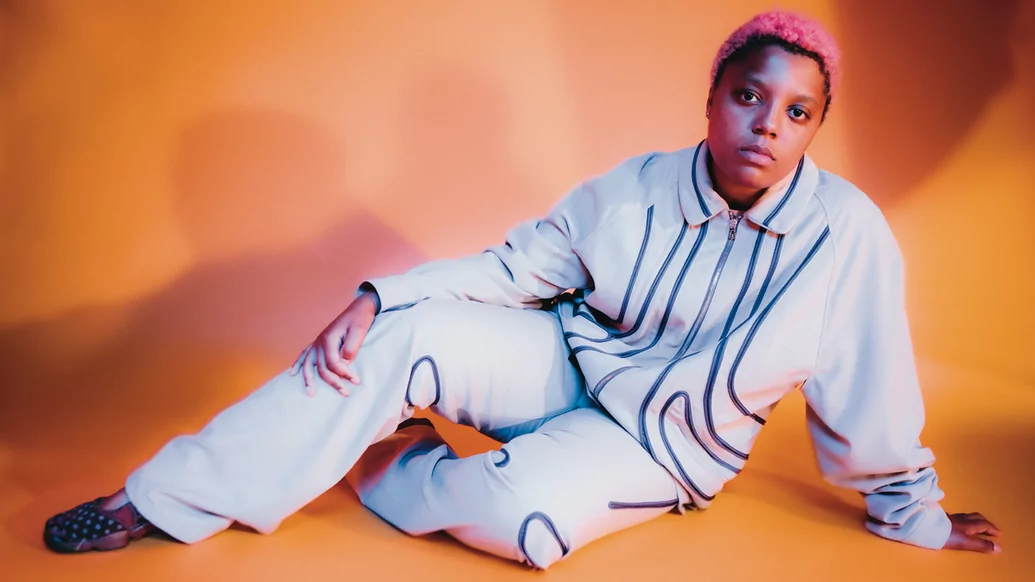
Queer expression has always been a core facet in James’ music. The tender ‘Queer Space (feat. Frances Bennet)’ from her 2017 debut album, ‘Detail’, pays tribute to found families and the feeling of being at home in a community. ‘For You & I’ celebrates queer love and intimacy (‘Sensual feat. feeo’), but equally articulates the anxiety and fear that so often comes with publicly showing affection (‘So Scared’, ‘Hand Drops’). On ‘Choose To Be Gay (Femenine)’, this theme takes on a fraught timbre, with James singing quiet variations of the phrase “Are you saying that I chose to? Are you saying that I want?” over downcast synths and sampled bells from Eastman’s work.
While writing the album, James found herself thinking of the ostracism Eastman faced because of his sexuality and race, while also considering society today: a feeling that, lately, things have once again become worse for marginalised people. “I feel like there’s more hate, isn’t there? Or everyone’s just more vocal about it now,” she says. The track ‘Black Excellence (Stay On It)’ — a storm of synths that collapses into a coda of Basinski-esque ambience — was named in reference to the disproportionately high expectations placed on Black people in order for them to thrive. “People always critique Black people to a higher standard than anyone else,” she says. “It’s like you have to do more to go anywhere near the same height as a white peer.”
Eastman’s presence on ‘Building Something Beautiful For Me’ is powerful, but you need only read its title to remember that this is a Loraine James record first and foremost; it’s also her first album to feature no vocal collaborators. ‘My Take’ — a blissed-out slice of IDM flecked with playful ‘Drukqs’-isms — features her own speaking voice, murmuring about its creation in real time: “This is just a rough sketch,” she says in its opening seconds. “With this record I just... I’ve been meaning to do something like this, and channel something different: a different headspace... I like to keep things quite raw.”
The track is one of two on the album to feature none of Eastman’s music, and is the closest it comes to the frenetic energy of her club sets. “If you were a big fan of Julius Eastman, you’d kinda screw your face at it,” she says.
As a lyricist, James works spontaneously, favouring repeated phrases and ad-libbed musings. Tracks like ‘Maybe If I (Stay On It)’ and the jagged ‘Simple Stuff’ from ‘Reflection’ were recorded in single takes, directly into her phone. “I just pressed record and the words came out of my mouth,” she says. “I get really stuck on lyrics a lot of the time. Sometimes I’ll just put my phone or notepad down and put myself under pressure and see what comes out.
“I guess it’s a subconscious thing,” she continues. “You’re saying it for a reason, but you don’t quite know why yet. That’s definitely happened a lot on the tracks I’ve made. I feel like I’m singing a bunch of shit, but then I’ll listen to it for a period of time, or something may happen or resurface, and the song will take on a whole different meaning.”
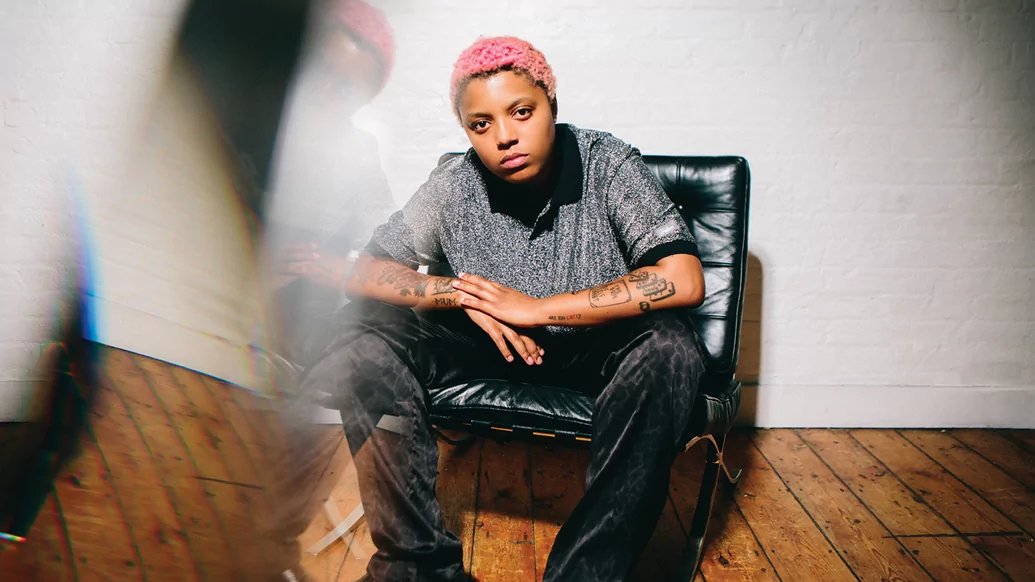
“I’m just doing me at the end of the day, and I want to keep doing that. I don’t want to be anyone else, or sound like anyone else.”
James grew up in Enfield, North London. Her mother — her biggest fan — played steel pans in a band; their tower block flat on the Alma Estate was usually filled with music, from calypso to Metallica. It was there that James began her own explorations, listening to Limp Bizkit and Kylie (and Dannii!) Minogue CDs that her uncle had burned for her. She fell in love with the pop-punk and emo sounds of Paramore and Death Cab For Cutie, and from there, took her first steps into the world of electronic music via the latter’s side-project The Postal Service; their producer Jimmy Tamborello’s Dntel alias also struck a chord, as did the albums of American IDM act Telefon Tel Aviv, who remains an all-time favourite and influence today.
Home is close to James’ heart. It was, of course, where she wrote her first tracks and albums; the cover shot of ‘For You & I’ was taken in front of her estate, where she’s seen holding up a photo of the same buildings from a decade before. She lived and worked locally as a teaching assistant in the same school as her mum until shortly after the breakout success of that release. The ‘Building Something Beautiful For Me’ track ‘Enfield, Always’ pays tribute to the rock bands James spent her youth listening to, with its ‘real’ drum-kit samples and whirling arpeggios. “It was about me going back to my roots,” she says.
James started taking keyboard lessons while in school and, at 16, after her GCSEs didn’t quite go to plan, she took a music production course at a nearby college on her mum’s encouragement. She later studied for a degree in Commercial Music at the University Of Westminster. It was through a live performance module there that she met the MC and producer Le3 bLACK; the pair struck up a close friendship and played their first set together at The Social in central London. They’ve gone on to work together frequently, with bLACK appearing as a vocalist on each of James’ first three albums. Did he sense that James was destined for big things when they first linked up at university?
“The countless rehearsals and genre-bending sounds we created, I knew she would be a star later on down the line,” he tells us. “She would be endlessly playing those keys, as if she was controlled by a puppeteer. Her sound has evolved into greater things... It flows continuously; even when you think you might trip up, it still winds you back in wanting more and more!”
Back then, James was absorbed in the world of math rock, a strand of guitar music characterised by its complex rhythms, off-kilter time signatures, contrapuntal melodies and upfront emotional register. If it sounds familiar, that’s because it should; the genre has influenced James’ music since day one. She describes her earliest productions as attempts to recreate the sound in her own way. “The way I played keyboard then — and even now still — was inspired by how math rock guitars sounded to me,” she says.
The opening track on ‘Settle Down’, the earliest release available on James’ Bandcamp, samples a track by the emo-adjacent math rock band TTNG; the panda that graces the group’s debut album cover is inked on her forearm. James is covered in tattoos: she has two representing the band Circa Survive, and one for Telefon Tel Aviv; the word ‘Mum’ sits on her arm beneath a set of steel pans; there’s one commemorating the release of ‘Reflection’, and another that simply reads, ‘Music Is Your Life’.
These musical allegiances have remained, even as James’ music has moved into new territory. In the past year, she’s recorded two math rock-themed episodes of her NTS show, and even played a math rock DJ set in support of the Japanese band Tricot when they played in London. (It was, incidentally, the only DJ set she’s ever really enjoyed doing — “We live and we learn, and we learn that it’s not our thing!”).
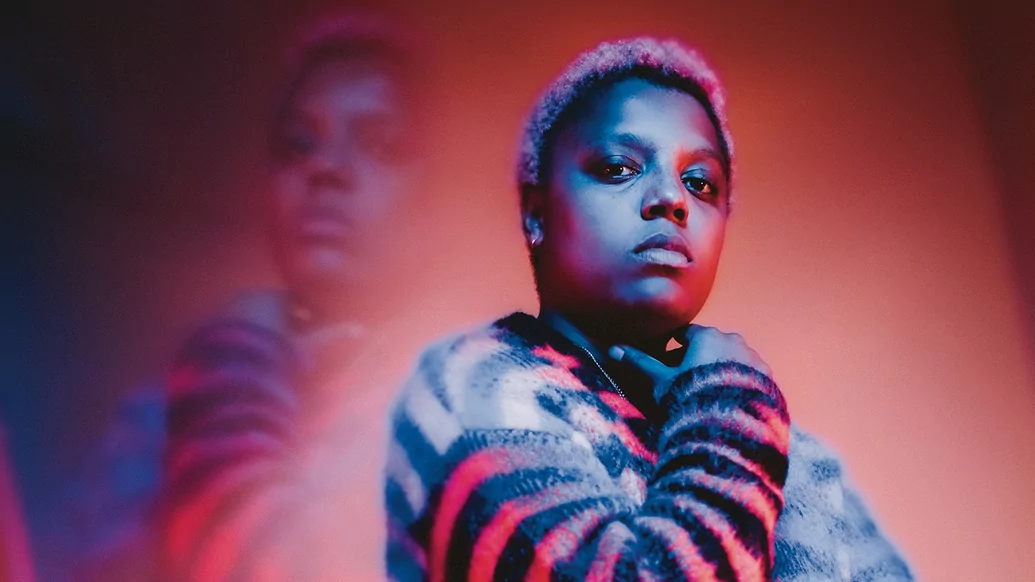
In April this year, James debuted her Whatever The Weather alias with a self-titled album on Ghostly International. Each of the collection’s 11 tracks are titled after temperatures, the project encompassing warming ambience (‘25°C’), ice-cold IDM (‘0°C’) and breaks that thunder like a storm in spring (‘17°C’). It gave James the opportunity to write and release music she felt didn’t fit into the releases under her given name; she worked in a loose, free-flowing fashion, writing most of the record in the months after writing ‘Reflection’, when ongoing Covid restrictions kept her at home and bored.
Some tracks on the album came together after 10-minute improvised jams, though one or two had been lingering unfinished on her hard drive for up to five years. One of those was ‘30°C’, a sun-baked R&B cut that features one of James’ most prominent vocal performances to date; she describes her singing on the track as being directly inspired by Mike Kinsella of the Midwest emo band, American Football. Elsewhere, on the gorgeous ‘25°C’, the influence of Deftones vocalist Chino Moreno is heard in James’ wordless, reverberating calls. “I love his screaming, but then he becomes very breathy, slow and sensual. It’s this vulnerable thing that I really like.”
Releasing ‘Whatever The Weather’ on Ghostly was a full-circle moment for James, who had long been a fan of the label and its affiliated artists. She had previously collaborated with HTRK’s Jonnine Standish on the yearning ‘Don’t You See It’ from 2020’s ‘Nothing’ EP, and had remixed Lusine’s ‘Retrace’ in early 2021.
Most notably, the album was mastered by Telefon Tel Aviv, whose releases (especially the album ‘Map Of What Is Effortless’) inspired James to incorporate more vocals in her work, as well as her love of glitching production. How did it feel to hand her music over to an artist who had impacted her so much? “It’s crazy that someone you admire would support your work,” she says plainly. “It still feels surreal to me. I’m always like, ‘Oh my god, he likes my stuff’. [The fact that he] wanted to take time out of his day to do that is crazy to me.”
That admiration is mutual. When we reach out to Telefon Tel Aviv’s Joshua Eustis, his eagerness to shine a light on James is palpable. “I loved working on ‘Whatever The Weather’,” he says. “It’s a slightly more watery, foggy take on Loraine’s music, but still with the bangers. Always the bangers tucked in there!
“Loraine is like [Japanese video game developer] Hideo Kojima,” he adds. “The wildest and most disparate tastes have crystallised in her a truly singular vision of what music could, or should, be. I hear a tremendous amount of curiosity in her music, and that’s one of my favourite things to listen for in anyone.”
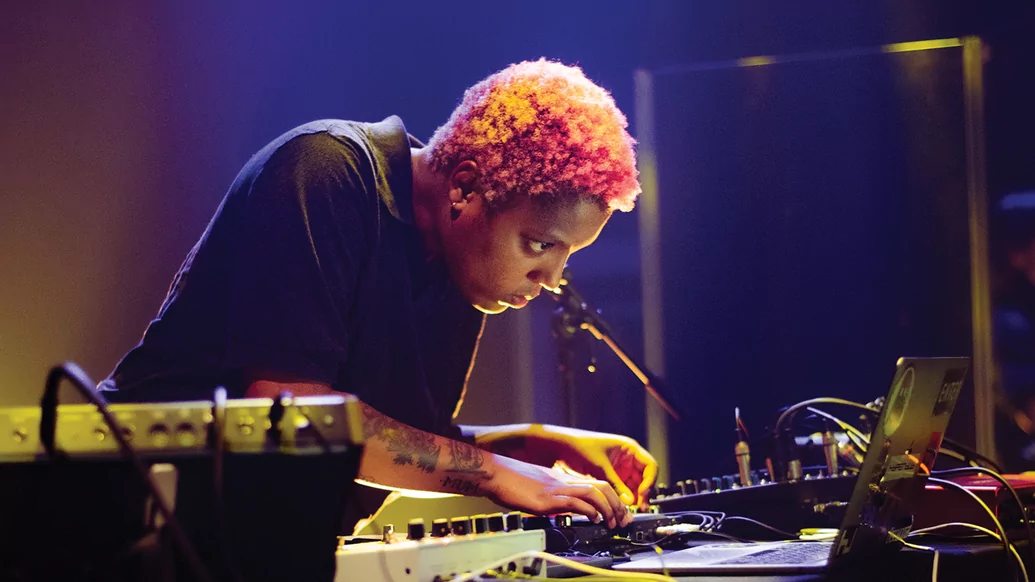
Whether it’s mercurial club music or luminous UK drill, there’s an open-hearted sensitivity to pretty much everything James produces today. While it took some time for her to express her inner world through her art, the works of acts like Eustis’ certainly played a role in getting her there. “I didn’t really see how electronic music could be emotional,” she says. “But then I got more interested in my feelings... Now everything I make towards an album is emotional.”
Still, the resonance her music has had with fans can feel hard to compute at times. “It’s weird hearing people say [my songs] mean something to them,” she says humbly, slumping down in her seat, an imaginary laptop balanced on her chest. “I made something sat at home like this, and you’re crying about it over there? It’s a strange thing... But over the past couple of years, I’ve realised that that’s kind of what I do.”
Making an album is “like therapy” for James, she says. “I usually bottle a lot of things up, and even if it’s in an instrumental track I feel like I finally face these thoughts and feelings [through that].”
More recently, she’s been speaking to a therapist to help unpick some of the underlying anxieties that have occupied her mind; it’s something she’s found rewarding, but it hasn’t been without its challenges. “I always put it off because I didn’t know what to talk about,” she says. “I felt like I couldn’t talk about anything, or I worried that there was nothing to talk about... I’m trying to be more comfortable with myself, and allow myself to reap the benefits of it. I’m still learning to open myself up. It’s hard; it takes a minute, for sure... I just need to keep going with it.”
In talk therapy, reaching an understanding of the ways we feel and respond to the world around us can be arduous — less like a lightbulb moment, and more like a slow dawning. It’s something James has found to be the case in her albums too, which only really reveal themselves to her as confronting particular themes in the final stages of their creation. Take ‘Reflection’, a record written in the depths of Covid-19 lockdowns in the summer of 2020. At the time, James would have baulked at the idea of creating a “pandemic album”, but looking at it now, it feels hard to separate its anxious beats and pensive lyrics from the fear and uncertainty that permeated that time. “I’d seen other albums being called that, and I was like, ‘That’s long, that’s miserable, man’,” she sighs. “But it does feel like that now. I accept it. There’s nothing wrong with that.”
The album found James at her most frank, working alongside collaborators including Baths, Eden Samara, Nova and Xzavier Stone. On the title track, her echoing voice speaks of missing friends and family and the “information overload” of the time over frosty keys and a tense, bass-heavy beat. The lyrics to ‘Self Doubt (Leaving The Club Early)’ are a candid representation of the confidence-shattering nerves that can come with playing live.
‘Simple Stuff’ and album closer ‘We’re Building Something New (feat. Iceboy Violet)’ were written in the wake of that summer’s Black Lives Matter protests, after the murder of George Floyd at the hands of police; their lyrics channelled that period’s pain and resilience poignantly. “There’s still processing to be done [from that time],” James says of 2020. “Stuff we haven’t even realised yet, or even stuff realised in the pandemic... It’s all a bit of a mind-fuckery thing.”
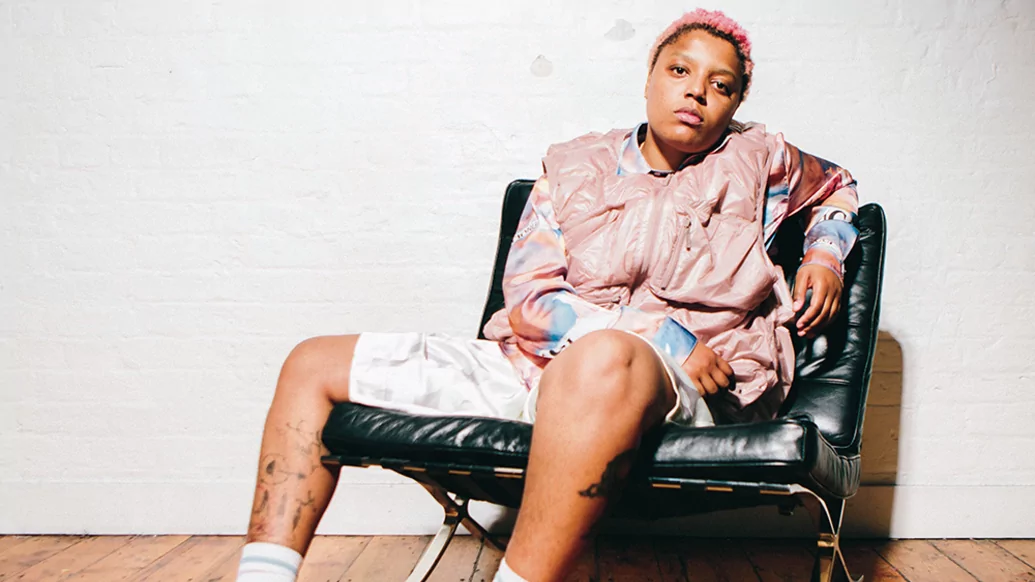
‘Reflection’ was James’ second LP to be released on Hyperdub, a label that has fostered her creativity since the release of ‘For You & I’. As the story goes, it was the DJ and producer object blue who put James onto founder Kode9’s radar, after inviting her onto her Rinse FM show as a guest in 2018 and tweeting the imprint, ‘You need Loraine on your label’. A few days later, they got in touch.
“Loraine’s music had an honesty and a melancholy to it that I warmed to,” Kode9 says now. “There is also a formal openness which means it feels pretty free, open-ended and loose in its structure. When you see Loraine play live there is a sense that you are getting a window into her studio, that she is sharing all the vulnerability of her studio process. That’s braver than most artists, and I think her fans really relate to the fact that there is an intimacy, that you are being invited into her world.”
“It was a label that I loved, and could only dream of being on,” says James, praising Kode9’s encouragement and understanding, and the freedom that creative relationship has afforded her. “What I love about Hyperdub as opposed to other labels is that, yeah, there’s a distinctive Hyperdub sound, but also, individually, there isn’t. You never know what the next record or artist is going to sound like. It always sounds different. There’s no two artists that are the same.”
It’s hard to overstate the significance of that last point for James, who highlights another Hyperdub affiliate, aya, as well as claire rousay and Space Afrika, as acts she’s been particularly blown away by recently. James caught the latter’s set at Unsound in October and was floored by their deep and dubwise take on ambient music. “It was just beautiful, man. One minute you’re just standing there, the next minute you’re thinking about your whole life, contemplating everything,” she says. “It was unreal. My eyes were welling up. I gave them a hug after the show and I could feel it in my throat. That’s a rarity. Their stuff always makes me feel something different.”
That rare feeling only comes from hearing something unique: those once-in-a-blue-moon bursts of creativity achieved only through the right mix of skill, intuition and heart. It’s a principle that has guided James, whose music could never be anything other than authentically hers. “At the end of the day, I don’t want to make music for others,” she affirms. “I maybe think about that once on release day, but when I’m making it I try and keep the mind-frame that I’m making it for myself.
“Sometimes I don’t really like what I make, but at the end of the day it’s still true to me,” she continues. “I would never want to release something that didn’t feel like me. Over the past couple of years I’ve been putting more of my emotions in, whether that’s shitty singing or experimenting with different sounds like drill or R&B. But I’m making it the Loraine James way. I know I could never replicate these things. I know what I can and can’t do as a producer, and I can’t do that — just because I don’t want to, because it already exists.”
James is adamant about not seeing her music-making process as a job, and recoils at the idea of working to a fixed schedule. “I don’t ever want to be like, ‘Oh, 2PM, it’s in my calendar, I need to make a beat!’ What if I don’t feel like making a beat at 2PM?” Instead, she works when the feeling takes her, be that at home after a game of FIFA or on a plane on the way to a show (thank you, Ableton Note app). “I work kind of quickly, so I don’t need a whole day,” she says. “I like to do it in a short time frame: this is how I’m feeling in this period of my life. Voilá!”
We wonder, after the year James has had, with so many accomplishments ticked off, what is on her list of goals as she looks to the future? Her next Hyperdub album is already nearing completion, with a cast of collaborators locked in that she’s keeping tight-lipped about for the time being. “It’s different from the last one,” she offers, simply. There are venues and festivals she’s eager to play for the first time and return to (she has a particular love for Dalston venue Cafe OTO), and she has dreams of producing music for a short film one day. Two weeks after we speak, James plays her first-ever shows in Japan, where she’s welcomed with open arms. She’s come a long way already, but it’s hard not to feel that, in many ways, things are really just getting started for her.
“I’m just doing me at the end of the day, and I want to keep doing that,” she says, “I don’t want to be anyone else, or sound like anyone else. Obviously not everyone’s going to like that, and that’s fine. I’m trying to make music that I like, and I do feel like I’m slowly enjoying my music more.” She pauses for a moment, before cracking a quick smile. “I have my days.”

